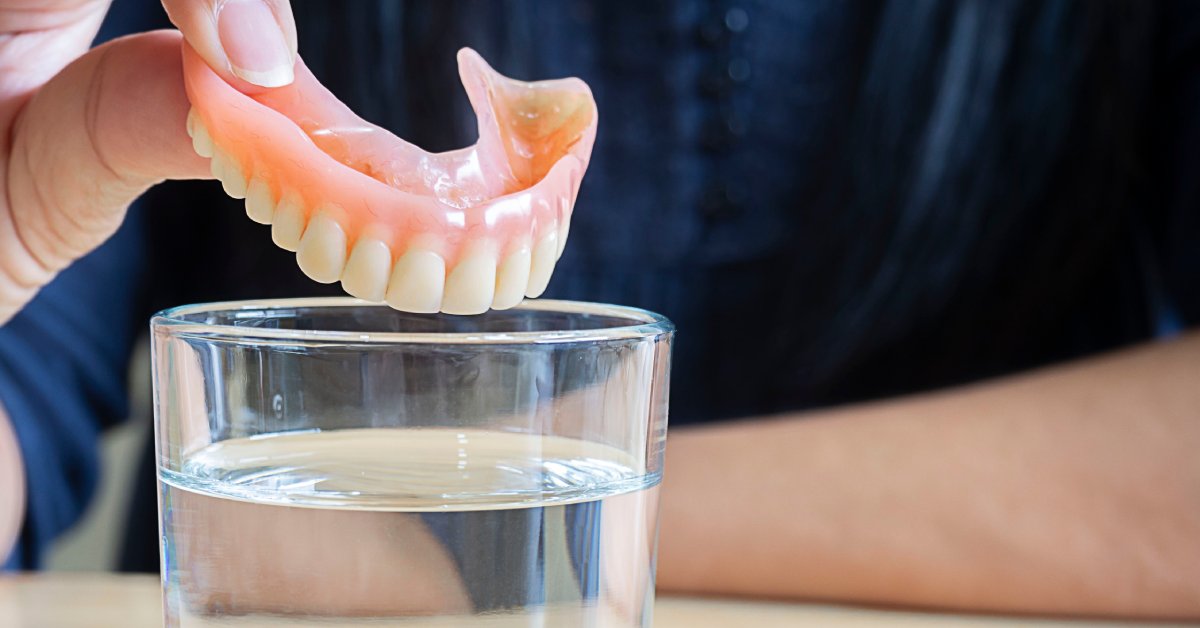
A well-fitting set of dentures can restore your ability to chew and speak clearly—and it’ll boost your confidence, too. It’s a wonderful feeling to share your smile freely! However, like any dental prosthetic, dentures have a lifespan. They experience wear and tear from daily use, and your mouth naturally changes over time.
Many people wonder how often to replace dentures, and the signs you need a new set are not always obvious. It’s a gradual process, but eventually, you will need to replace them to maintain your oral health and comfort. Recognizing the early indicators can prevent discomfort.
This post will explore the typical lifespan of dentures and detail the signs that it’s time for an upgrade. Knowing what to look for ensures your smile remains as healthy and beautiful as the day you got your dentures.
The Typical Lifespan of a Denture Set
So, how long can you expect your dentures to last? On average, a full set of dentures needs replacement every 5 to 10 years. Several factors influence this timeline, including the following:
- The materials used to make the dentures
- Your oral hygiene habits
- How you chew
- What you eat
- The natural changes that occur in your jawbone and gums
Over time, the jawbone naturally recedes when teeth are missing. This process, called resorption, causes the shape of your gums to change. As a result, dentures that once fit perfectly can become loose and unstable. Daily chewing and cleaning also cause the acrylic base and artificial teeth to wear down, affecting both fit and function. Regular check-ups with your dentist are crucial to monitor these changes and determine the right time for a replacement.

Signs You Need To Replace Your Dentures
Paying attention to how your dentures feel and work is key. If you notice any of the following signs, it may be time to schedule a visit with your dentist to discuss your options.
Your Dentures Feel Loose
One of the most common signs that you need new dentures is a change in fit. If your dentures slip when you talk, eat, or laugh, it’s a clear indicator that they no longer conform to the shape of your gums. You might find yourself using more and more denture adhesive to keep them in place. A loose fit is frustrating, and it can cause irritation and sores.
You Experience Pain or Discomfort
Your dentures should feel comfortable in your mouth. If you start to experience persistent pain, sore spots, or irritation on your gums, it’s a sign that your dentures do not fit properly. This discomfort can result from uneven pressure on your gums, which can cause inflammation and even infections if left unaddressed.
You Have Difficulty Speaking Clearly
When dentures fit well, they support clear speech. If you suddenly notice a lisp, slurring, or a clicking sound when you talk, your dentures may be loose or shifting. These speech difficulties can be embarrassing and frustrating, impacting your daily interactions and confidence.
You Have Trouble Chewing
Well-fitting dentures allow you to chew a variety of foods comfortably. If you find it increasingly difficult to chew your food thoroughly, or if you start avoiding certain foods because they are too challenging to eat, your dentures may be the culprit. Worn-down teeth on the denture can reduce chewing efficiency, affecting your diet and overall nutrition.
Chronic Bad Breath or Unpleasant Taste
Bad breath or a lingering bad taste in your mouth could be a sign that your dentures aren’t fitting correctly or may be infected. Food particles, bacteria, viruses, and/or fungi can get trapped in poorly fitting dentures, leading to unpleasant odors or even infections of your gum tissue. Regular professional cleanings and adjustments can address these issues, ensuring your dentures remain fresh and hygienic. That said, if the issue persists, the solution may be a better-fitting set.
Your Dentures Show Visible Signs of Wear
Take a close look at your dentures. Do you see any visible signs of damage?
- Cracks or chips: Small fractures in the base or teeth can harbor bacteria and may lead to a complete break.
- Worn-down teeth: The chewing surfaces can become smooth over time, making it harder to eat.
- Discoloration: Stains that cannot be removed with regular cleaning can make your dentures look unnatural.
Any visible damage is a good reason to see your dentist. Even small issues can worsen over time and compromise the function of your dentures.
You Notice Changes in Your Facial Appearance
Dentures provide support for your lips and cheeks, contributing to a fuller facial appearance. As your jawbone changes and your dentures wear down, you may notice that your face looks sunken or that new wrinkles have appeared around your mouth. A new, properly fitted set of dentures can restore facial support and give you a more youthful look.

Maintenance Tips To Extend Denture Lifespan
While dentures don’t last forever, proper care can keep them in great condition for as long as possible.
Clean Your Dentures Daily
Cleaning your dentures daily is essential to remove food particles, plaque, and bacteria. Use a soft-bristled toothbrush and a denture-specific cleaner to avoid damaging the material. Avoid abrasive toothpaste, as it can scratch the surface of the dentures, making them more prone to staining and wear.
Handle With Care
Always handle your dentures carefully when cleaning or removing them. Dropping them on a hard surface can cause cracks or breaks. Consider placing a towel or filling the sink with water while cleaning, just in case.
Soak Your Dentures Overnight
Soaking dentures in a denture solution or water overnight helps keep them hydrated and prevents them from drying out or warping. Never use hot water, as it can distort the shape of the dentures.
Maintain Oral Hygiene
Even if you wear full dentures, keeping your gums healthy is important. Gently brush your gums, tongue, and the roof of your mouth with a soft toothbrush to remove bacteria and stimulate circulation.
Schedule Regular Dental Check-Ups
Routine dental visits are crucial for assessing the fit and condition of your dentures. Your dentist can identify issues early, recommend adjustments, and ensure your gums and jawbone remain healthy.
Taking the Next Step
Recognizing these signs will help you determine how often you need to replace your set of dentures to maintain your oral health and quality of life. If any of these symptoms sound familiar, don’t wait for the problem to get worse. Consult your dental team to discuss your options.
Whether you need a simple adjustment, a reline, or a completely new set, professional denture services from Pinnacle Dental Associates will get you feeling 100 percent again. Your smile and comfort are worth the investment. Contact our friendly team today to schedule a consultation.
